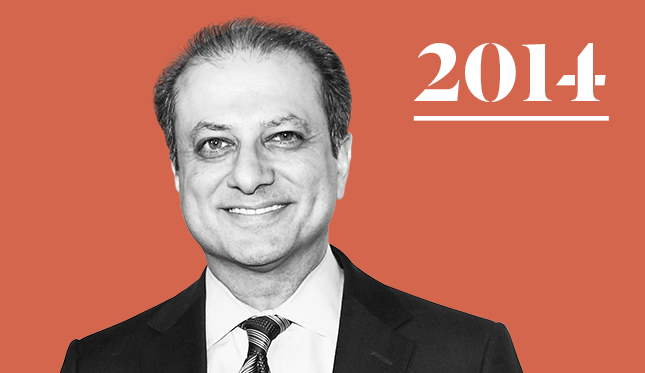
Preet Bharara. Photo by Brian Ach/Getty Images for Bloomberg. Graphic by Amy Petriello
The former United States Attorney for the Southern District of New York topped the Power 100 list in 2014. Here, Worth looks back at Preet Bharara’s path to power, the power play that landed him in the top spot and where he is now.
What We Said Then
Path to Power: Preetinder Singh Bharara came to the U.S. with his parents from India when he was just 2. He attended Harvard and Columbia Law. After working in private practice, Bharara became an assistant U.S. district attorney under DA Mary Jo White, then served as legal counsel for New York senator Chuck Schumer. Bharara was nominated to his current position by President Obama in May 2009.
Power Play: Bharara’s investigations of insider trading at the hedge funds Galleon and SAC Capital resulted in multiple convictions and a shaken industry. He has helped win billions of dollars in settlements from banks such as Deutsche Bank, Citigroup and Bank of America. Bharara’s record isn’t perfect—critics point out that he’s been unable to prosecute, much less convict, any individual connected to the precrisis mortgage frauds. But without question, Bharara has effectively and skillfully wielded the power of his office to address widespread financial crime. After five years in office, has he succeeded in changing the culture of Wall Street over the long term? The jury’s still out. But it’s hard to think of anyone who has tried harder or done more to save the financial industry from its own worst instincts.
Where Bharara is Now
Bharara was fired by President Trump in 2017 after seven and a half years with the Southern District. Since then, he has been a passionate voice on issues of politics and law. He hosts a podcast, Stay Tuned With Preet, appears on news and political shows, tweets regularly and came out with Doing Justice, his first book, earlier this year. Speaking in April to the New York Times about the aftermath of the financial crisis, he noted, “Justice and the law are two different things...I don’t think justice was done. Overall justice—cosmic justice, as they say. There’s a lot to be angry about and people have a lot to be sorry for.”









